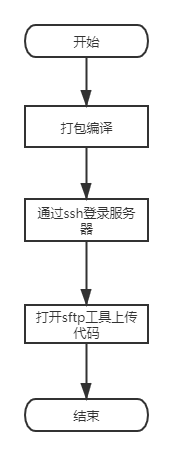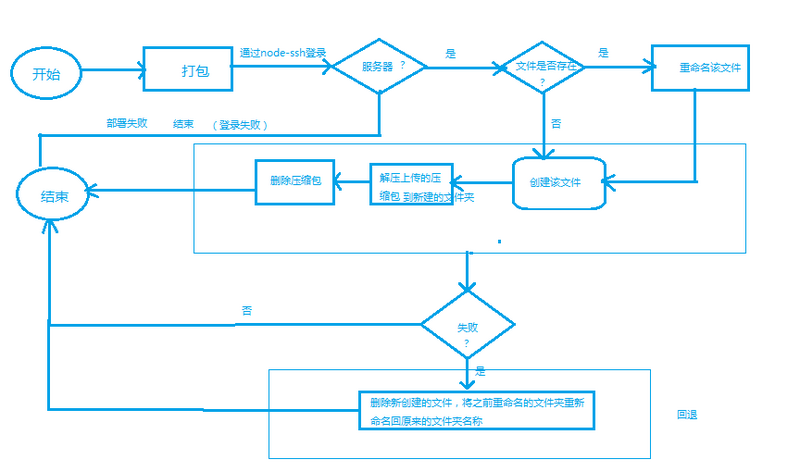前端工程化中的自动化部署
前言
在前端工程化中,前端开发人员终于在不断的提高自己的地位,再也不是简单的切图仔了。当然,随之而来的就是我们的工作内容变得越来越多,变得越来越繁琐。不仅要不断的学习新的前端技术内容,而且还要独立维护前端的部署工作。因此,如何能快速的进行工程化内容的部署,就是一件非常有价值的事情。
快速部署
对于前端的部署来说,其实主要就是将编译后的工程化项目(以vue来说就是将npm run build的dist文件夹)直接部署到对应的服务器的指定目录下即可,其他的内容我们暂时不在此处做过多的讲解。 因此,目前一般会使用SFTP工具(如:FileZilla:https://www.filezilla.cn/,Cyberduck:https://cyberduck.io/)来上传构建好的前端代码到服务器。这种方式虽然也是比较快的,但是每次要自己进行打包编译=》压缩=》打开对应的工具=》找到对应的路径,手动的将相关的文件上传到对应的服务中。并且为了部署到不同的环境中(一般项目开发包括:dev开发环境、test测试环境、uat测试环境、pro测试环境等)还要重复的进行多次的重复性操作。这种方式不仅繁琐,而且还降低了我们程序员的身份。所以我们需要用自动化部署来代替手动 ,这样一方面可以提高部署效率,另一方面开发人员可以少做一些他们以为的无用功。
准备工作
话不多说,说干就干。首先,我们先梳理一下一般的部署流程,主要是先将本地的工程化代码进行打包编译=>通过ssh登录到服务器=>将本地编译的代码上传到服务器指定的路径中,具体流程如下:
因此,通过代码实现自动化部署脚本,主要需要实现如下,下面以vue项目来为工程项目来具体讲解:
- 实现本地代码编译;可直接配置npm run build即可进行相关的打包
- 实现本地编译的代码压缩
- 通过ssh连接远程服务器
- 检查对应的远程部署路径是否存在,不存在需要创建
- 上传本地的压缩包
- 解压上传的压缩包
- 删除上传的压缩包
- 关闭ssh连接
- 删除本地的压缩包
具体实现
为了在能够实现以上的几个步骤,我们需要引入一些依赖包,以此来进行相关步骤的操作和日志的打印输出
- chalk:格式化输出日志的插件,可以通过配置不同的颜色来显示不同的日志打印。https://www.npmjs.com/package/chalk
- child_process:nodejs的一个子进程模块,可以用来创建一个子进程,并执行一些任务,可以直接在js里面调用shell命令。http://nodejs.cn/api/child_process.html
- jszip:一个轻量级的zip压缩库,用于压缩编译后的脚本。https://stuk.github.io/jszip/
- ssh2:用于通过ssh来连接远程服务器的插件。https://github.com/mscdex/ssh2
大致流程如下:
基本配置
为了能够将部署相关的内容,如服务器信息,部署的路径等内容进行统一的管理,以便进行未来的可视化配置。因此,在项目中创建一个独立的文件夹,统一管理部署相关的文件,并且建立一个config.js和ssh.js文件,分别用于配置相关的部署信息和具体的部署脚本。其中,config.js中的配置具体如下:
const config = {
// 开发环境
dev: {
host: '',
username: 'root',
password: '',
catalog: '', // 前端文件压缩目录
port: 22, // 服务器ssh连接端口号
privateKey: null // 私钥,私钥与密码二选一
},
// 测试环境
test: {
host: '', // 服务器ip地址或域名
username: 'root', // ssh登录用户
password: '', // 密码
catalog: '', // 前端文件压缩目录
port: 22, // 服务器ssh连接端口号
privateKey: null // 私钥,私钥与密码二选一
},
// 线上环境
pro: {
host: '', // 服务器ip地址或域名
username: 'root', // ssh登录用户
password: '', // 密码,请勿将此密码上传至git服务器
catalog: '', // 前端文件压缩目录
port: 22, // 服务器ssh连接端口号
privateKey: null // 私钥,私钥与密码二选一
}
}
module.exports = {
// publishEnv: pro,
publishEnv: config.pro, // 发布环境
buildDist: 'dist', // 前端文件打包之后的目录,默认dist
buildCommand: 'npm run build', // 打包前端文件的命令
readyTimeout: 20000, // ssh连接超时时间
deleteFile: true, // 是否删除线上上传的dist压缩包
isNeedBuild: true // s是否需要打包
}压缩打包内容
压缩打包的内容,使用JSZIP插件,初始化一个const zip = new JSZIP(),然后在按照对应的语法进行具体的实现,其实现过程主要是通过的先递归读取相关的文件,然后加入到zip对象中,最后通过插件进行具体的压缩,最后写入到磁盘中。具体代码如下:
递归读取打包文件 // 读取文件
readDir (obj, nowPath) {
const files = fs.readdirSync(nowPath) // 读取目录中的所有文件及文件夹(同步操作)
files.forEach((fileName, index) => {
// 遍历检测目录中的文件
// console.log(fileName, index) // 打印当前读取的文件名
const fillPath = nowPath + '/' + fileName
const file = fs.statSync(fillPath) // 获取一个文件的属性
if (file.isDirectory()) {
// 如果是目录的话,继续查询
const dirlist = zip.folder(fileName) // 压缩对象中生成该目录
this.readDir(dirlist, fillPath) // 重新检索目录文件
} else {
obj.file(fileName, fs.readFileSync(fillPath)) // 压缩目录添加文件
}
})
}压缩文件夹下的所有文件// 压缩文件夹下的所有文件
zipFile (filePath) {
return new Promise((resolve, reject) => {
let desc =
'*******************************************\n' +
'*** 正在压缩 ***\n' +
'*******************************************\n'
console.log(chalk.blue(desc))
this.readDir(zip, filePath)
zip
.generateAsync({
// 设置压缩格式,开始打包
type: 'nodebuffer', // nodejs用
compression: 'DEFLATE', // 压缩算法
compressionOptions: {
// 压缩级别
level: 9
}
})
.then(content => {
fs.writeFileSync(
path.join(rootDir, '/', this.fileName),
content,
'utf-8'
)
desc =
'*******************************************\n' +
'*** 压缩成功 ***\n' +
'*******************************************\n'
console.log(chalk.green(desc))
resolve({
success: true
})
}).catch(err => {
console.log(chalk.red(err))
reject(err)
})
})
}使用child_process的exec来运行npm run build脚本打包// 打包本地前端文件
buildProject () {
return new Promise((resolve, reject) => {
exec(Config.buildCommand, async (error, stdout, stderr) => {
if (error) {
console.error(error)
reject(error)
} else if (stdout) {
resolve({
stdout,
success: true
})
} else {
console.error(stderr)
reject(stderr)
}
})
})
}
连接ssh服务器通过ssh2的client来创建ssh连接 // 连接服务器
connectServer () {
return new Promise((resolve, reject) => {
const conn = this.conn
conn
.on('ready', () => {
resolve({
success: true
})
})
.on('error', (err) => {
reject(err)
})
.on('end', () => {
const desc =
'*******************************************\n' +
'*** SSH连接已结束 ***\n' +
'*******************************************\n'
console.log(chalk.green(desc))
})
.on('close', () => {
const desc =
'*******************************************\n' +
'*** SSH连接已关闭 ***\n' +
'*******************************************\n'
console.log(chalk.green(desc))
})
.connect(this.server)
})
}
上传压缩的工程文件判断上传路径是否存在// 判断文件是否存在,如果不存在则进行创建文件夹
await sshCon.execSsh(
`
if [[ ! -d ${sshConfig.catalog} ]]; then
mkdir -p ${sshConfig.catalog}
fi
`
)通过client的sftp讲本地的压缩包上传到指定的服务器的对应地址 // 上传文件
uploadFile ({ localPath, remotePath }) {
return new Promise((resolve, reject) => {
return this.conn.sftp((err, sftp) => {
if (err) {
reject(err)
} else {
sftp.fastPut(localPath, remotePath, (err, result) => {
if (err) {
reject(err)
}
resolve({
success: true,
result
})
})
}
})
})
}
解压上传的工程文件通过exec来执行ssh命令的 // 执行ssh命令
execSsh (command) {
return new Promise((resolve, reject) => {
return this.conn.exec(command, (err, stream) => {
if (err || !stream) {
reject(err)
} else {
stream
.on('close', (code, signal) => {
resolve({
success: true
})
})
.on('data', function (data) {
})
.stderr.on('data', function (data) {
resolve({
success: false,
error: data.toString()
})
})
}
})
})
}解压上传的压缩文件desc =
'*******************************************\n' +
'*** 上传文件成功,开始解压文件 ***\n' +
'*******************************************\n'
console.log(chalk.green(desc))
const zipRes = await sshCon
.execSsh(
`unzip -o ${sshConfig.catalog + '/' + fileName} -d ${sshConfig.catalog}`
)
.catch((e) => {})
if (!zipRes || !zipRes.success) {
console.error('----解压文件失败,请手动解压zip文件----')
console.error(`----错误原因:${zipRes.error}----`)
return false
} else if (Config.deleteFile) {
desc =
'*******************************************\n' +
'*** 解压文件成功,开始删除上传的压缩包 ***\n' +
'*******************************************\n'
console.log(chalk.green(desc))
删除上传的工程文件删除对应的压缩包 desc =
'*******************************************\n' +
'*** 解压文件成功,开始删除上传的压缩包 ***\n' +
'*******************************************\n'
console.log(chalk.green(desc))
// 注意:rm -rf为危险操作,请勿对此段代码做其他非必须更改
const deleteZipRes = await sshCon
.execSsh(`rm -rf ${sshConfig.catalog + '/' + fileName}`)
.catch((e) => {})
if (!deleteZipRes || !deleteZipRes.success) {
console.log(chalk.pink('----删除文件失败,请手动删除zip文件----'))
console.log(chalk.red(`----错误原因:${deleteZipRes.error}----`))
return false
}
关闭ssh连接封装关闭的服务器连接 // 结束连接
endConn () {
this.conn.end()
if (this.connAgent) {
this.connAgent.end()
}
}
删除本地的压缩包文件封装删除本地的压缩包 // 删除本地文件
deleteLocalFile () {
return new Promise((resolve, reject) => {
fs.unlink(path.join(rootDir, '/', this.fileName), function (error) {
if (error) {
const desc =
'*******************************************\n' +
'*** 本地文件删除失败 ***\n' +
'*******************************************\n'
console.log(chalk.yellow(desc))
reject(error)
} else {
const desc =
'*******************************************\n' +
'*** 删除成功 ***\n' +
'*******************************************\n'
console.log(chalk.blue(desc))
resolve({
success: true
})
}
})
})
}
脚本命令的配置在项目的package.json中配置命令"ssh": "node ./build/ssh.js"
完整的实现ssh流程// SSH连接,上传,解压,删除等相关操作
async function sshUpload (sshConfig, fileName) {
const sshCon = new SSH(sshConfig)
const sshRes = await sshCon.connectServer().catch((e) => {
console.error(e)
})
if (!sshRes || !sshRes.success) {
const desc =
'*******************************************\n' +
'*** ssh连接失败 ***\n' +
'*******************************************\n'
console.log(chalk.red(desc))
return false
}
let desc =
'*******************************************\n' +
'*** 连接服务器成功,开始上传文件 ***\n' +
'*******************************************\n'
console.log(chalk.green(desc))
// 判断文件是否存在,如果不存在则进行创建文件夹
await sshCon.execSsh(
`
if [[ ! -d ${sshConfig.catalog} ]]; then
mkdir -p ${sshConfig.catalog}
fi
`
)
const uploadRes = await sshCon
.uploadFile({
localPath: path.join(rootDir, '/', fileName),
remotePath: sshConfig.catalog + '/' + fileName
})
.catch((e) => {
console.error(e)
})
if (!uploadRes || !uploadRes.success) {
console.error('----上传文件失败,请重新上传----')
return false
}
desc =
'*******************************************\n' +
'*** 上传文件成功,开始解压文件 ***\n' +
'*******************************************\n'
console.log(chalk.green(desc))
const zipRes = await sshCon
.execSsh(
`unzip -o ${sshConfig.catalog + '/' + fileName} -d ${sshConfig.catalog}`
)
.catch((e) => {})
if (!zipRes || !zipRes.success) {
console.error('----解压文件失败,请手动解压zip文件----')
console.error(`----错误原因:${zipRes.error}----`)
return false
} else if (Config.deleteFile) {
desc =
'*******************************************\n' +
'*** 解压文件成功,开始删除上传的压缩包 ***\n' +
'*******************************************\n'
console.log(chalk.green(desc))
// 注意:rm -rf为危险操作,请勿对此段代码做其他非必须更改
const deleteZipRes = await sshCon
.execSsh(`rm -rf ${sshConfig.catalog + '/' + fileName}`)
.catch((e) => {})
if (!deleteZipRes || !deleteZipRes.success) {
console.log(chalk.pink('----删除文件失败,请手动删除zip文件----'))
console.log(chalk.red(`----错误原因:${deleteZipRes.error}----`))
return false
}
}
// 结束ssh连接
sshCon.endConn()
return true
}
实际运行脚本// 执行前端部署
;(async () => {
const file = new File()
let desc =
'*******************************************\n' +
'*** 开始编译 ***\n' +
'*******************************************\n'
if (Config.isNeedBuild) {
console.log(chalk.green(desc))
// 打包文件
const buildRes = await file
.buildProject()
.catch((e) => {
console.error(e)
})
if (!buildRes || !buildRes.success) {
desc =
'*******************************************\n' +
'*** 打包出错,请检查错误 ***\n' +
'*******************************************\n'
console.log(chalk.red(desc))
return false
}
console.log(chalk.blue(buildRes.stdout))
desc =
'*******************************************\n' +
'*** 编译成功 ***\n' +
'*******************************************\n'
console.log(chalk.green(desc))
}
// 压缩文件
const res = await file
.zipFile(path.join(rootDir, '/', Config.buildDist))
.catch(() => {})
if (!res || !res.success) return false
desc =
'*******************************************\n' +
'*** 开始部署 ***\n' +
'*******************************************\n'
console.log(chalk.green(desc))
const bol = await sshUpload(Config.publishEnv, file.fileName)
if (bol) {
desc =
'\n******************************************\n' +
'*** 部署成功 ***\n' +
'******************************************\n'
console.log(chalk.green(desc))
file.stopProgress()
} else {
process.exit(1)
}
})()
完整的ssh.js代码
const { exec } = require('child_process')
const path = require('path')
const JSZIP = require('jszip')
const fs = require('fs')
const Client = require('ssh2').Client
const Config = require('./config.js')
const chalk = require('chalk')
const zip = new JSZIP()
// 前端打包文件的目录
const rootDir = path.resolve(__dirname, '..')
/**
* ssh连接
*/
class SSH {
constructor ({ host, port, username, password, privateKey }) {
this.server = {
host,
port,
username,
password,
privateKey
}
this.conn = new Client()
}
// 连接服务器
connectServer () {
return new Promise((resolve, reject) => {
const conn = this.conn
conn
.on('ready', () => {
resolve({
success: true
})
})
.on('error', (err) => {
reject(err)
})
.on('end', () => {
const desc =
'*******************************************\n' +
'*** SSH连接已结束 ***\n' +
'*******************************************\n'
console.log(chalk.green(desc))
})
.on('close', () => {
const desc =
'*******************************************\n' +
'*** SSH连接已关闭 ***\n' +
'*******************************************\n'
console.log(chalk.green(desc))
})
.connect(this.server)
})
}
// 上传文件
uploadFile ({ localPath, remotePath }) {
return new Promise((resolve, reject) => {
return this.conn.sftp((err, sftp) => {
if (err) {
reject(err)
} else {
sftp.fastPut(localPath, remotePath, (err, result) => {
if (err) {
reject(err)
}
resolve({
success: true,
result
})
})
}
})
})
}
// 执行ssh命令
execSsh (command) {
return new Promise((resolve, reject) => {
return this.conn.exec(command, (err, stream) => {
if (err || !stream) {
reject(err)
} else {
stream
.on('close', (code, signal) => {
resolve({
success: true
})
})
.on('data', function (data) {
})
.stderr.on('data', function (data) {
resolve({
success: false,
error: data.toString()
})
})
}
})
})
}
// 结束连接
endConn () {
this.conn.end()
if (this.connAgent) {
this.connAgent.end()
}
}
}
/*
* 本地操作
* */
class File {
constructor () {
this.fileName = this.formateName()
}
// 删除本地文件
deleteLocalFile () {
return new Promise((resolve, reject) => {
fs.unlink(path.join(rootDir, '/', this.fileName), function (error) {
if (error) {
const desc =
'*******************************************\n' +
'*** 本地文件删除失败 ***\n' +
'*******************************************\n'
console.log(chalk.yellow(desc))
reject(error)
} else {
const desc =
'*******************************************\n' +
'*** 删除成功 ***\n' +
'*******************************************\n'
console.log(chalk.blue(desc))
resolve({
success: true
})
}
})
})
}
// 读取文件
readDir (obj, nowPath) {
const files = fs.readdirSync(nowPath) // 读取目录中的所有文件及文件夹(同步操作)
files.forEach((fileName, index) => {
// 遍历检测目录中的文件
// console.log(fileName, index) // 打印当前读取的文件名
const fillPath = nowPath + '/' + fileName
const file = fs.statSync(fillPath) // 获取一个文件的属性
if (file.isDirectory()) {
// 如果是目录的话,继续查询
const dirlist = zip.folder(fileName) // 压缩对象中生成该目录
this.readDir(dirlist, fillPath) // 重新检索目录文件
} else {
obj.file(fileName, fs.readFileSync(fillPath)) // 压缩目录添加文件
}
})
}
// 压缩文件夹下的所有文件
zipFile (filePath) {
return new Promise((resolve, reject) => {
let desc =
'*******************************************\n' +
'*** 正在压缩 ***\n' +
'*******************************************\n'
console.log(chalk.blue(desc))
this.readDir(zip, filePath)
zip
.generateAsync({
// 设置压缩格式,开始打包
type: 'nodebuffer', // nodejs用
compression: 'DEFLATE', // 压缩算法
compressionOptions: {
// 压缩级别
level: 9
}
})
.then(content => {
fs.writeFileSync(
path.join(rootDir, '/', this.fileName),
content,
'utf-8'
)
desc =
'*******************************************\n' +
'*** 压缩成功 ***\n' +
'*******************************************\n'
console.log(chalk.green(desc))
resolve({
success: true
})
}).catch(err => {
console.log(chalk.red(err))
reject(err)
})
})
}
// 打包本地前端文件
buildProject () {
return new Promise((resolve, reject) => {
exec(Config.buildCommand, async (error, stdout, stderr) => {
if (error) {
console.error(error)
reject(error)
} else if (stdout) {
resolve({
stdout,
success: true
})
} else {
console.error(stderr)
reject(stderr)
}
})
})
}
// 停止程序之前需删除本地压缩包文件
stopProgress () {
this.deleteLocalFile()
.catch((e) => {
console.log(chalk.red('----删除本地文件失败,请手动删除----'))
console.log(chalk.red(e))
process.exit(1)
})
.then(() => {
const desc =
'*******************************************\n' +
'*** 已删除本地压缩包文件 ***\n' +
'*******************************************\n'
console.log(chalk.green(desc))
process.exitCode = 0
})
}
// 格式化命名文件名称
formateName () {
// 压缩包的名字
const date = new Date()
const year = date.getFullYear()
const month = date.getMonth() + 1
const day = date.getDate()
const timeStr = `${year}_${month}_${day}`
return `${Config.buildDist}-${timeStr}-${Math.random()
.toString(16)
.slice(2)}.zip`
}
}
// SSH连接,上传,解压,删除等相关操作
async function sshUpload (sshConfig, fileName) {
const sshCon = new SSH(sshConfig)
const sshRes = await sshCon.connectServer().catch((e) => {
console.error(e)
})
if (!sshRes || !sshRes.success) {
const desc =
'*******************************************\n' +
'*** ssh连接失败 ***\n' +
'*******************************************\n'
console.log(chalk.red(desc))
return false
}
let desc =
'*******************************************\n' +
'*** 连接服务器成功,开始上传文件 ***\n' +
'*******************************************\n'
console.log(chalk.green(desc))
// 判断文件是否存在,如果不存在则进行创建文件夹
await sshCon.execSsh(
`
if [[ ! -d ${sshConfig.catalog} ]]; then
mkdir -p ${sshConfig.catalog}
fi
`
)
const uploadRes = await sshCon
.uploadFile({
localPath: path.join(rootDir, '/', fileName),
remotePath: sshConfig.catalog + '/' + fileName
})
.catch((e) => {
console.error(e)
})
if (!uploadRes || !uploadRes.success) {
console.error('----上传文件失败,请重新上传----')
return false
}
desc =
'*******************************************\n' +
'*** 上传文件成功,开始解压文件 ***\n' +
'*******************************************\n'
console.log(chalk.green(desc))
const zipRes = await sshCon
.execSsh(
`unzip -o ${sshConfig.catalog + '/' + fileName} -d ${sshConfig.catalog}`
)
.catch((e) => {})
if (!zipRes || !zipRes.success) {
console.error('----解压文件失败,请手动解压zip文件----')
console.error(`----错误原因:${zipRes.error}----`)
return false
} else if (Config.deleteFile) {
desc =
'*******************************************\n' +
'*** 解压文件成功,开始删除上传的压缩包 ***\n' +
'*******************************************\n'
console.log(chalk.green(desc))
// 注意:rm -rf为危险操作,请勿对此段代码做其他非必须更改
const deleteZipRes = await sshCon
.execSsh(`rm -rf ${sshConfig.catalog + '/' + fileName}`)
.catch((e) => {})
if (!deleteZipRes || !deleteZipRes.success) {
console.log(chalk.pink('----删除文件失败,请手动删除zip文件----'))
console.log(chalk.red(`----错误原因:${deleteZipRes.error}----`))
return false
}
}
// 结束ssh连接
sshCon.endConn()
return true
}
// 执行前端部署
;(async () => {
const file = new File()
let desc =
'*******************************************\n' +
'*** 开始编译 ***\n' +
'*******************************************\n'
if (Config.isNeedBuild) {
console.log(chalk.green(desc))
// 打包文件
const buildRes = await file
.buildProject()
.catch((e) => {
console.error(e)
})
if (!buildRes || !buildRes.success) {
desc =
'*******************************************\n' +
'*** 打包出错,请检查错误 ***\n' +
'*******************************************\n'
console.log(chalk.red(desc))
return false
}
console.log(chalk.blue(buildRes.stdout))
desc =
'*******************************************\n' +
'*** 编译成功 ***\n' +
'*******************************************\n'
console.log(chalk.green(desc))
}
// 压缩文件
const res = await file
.zipFile(path.join(rootDir, '/', Config.buildDist))
.catch(() => {})
if (!res || !res.success) return false
desc =
'*******************************************\n' +
'*** 开始部署 ***\n' +
'*******************************************\n'
console.log(chalk.green(desc))
const bol = await sshUpload(Config.publishEnv, file.fileName)
if (bol) {
desc =
'\n******************************************\n' +
'*** 部署成功 ***\n' +
'******************************************\n'
console.log(chalk.green(desc))
file.stopProgress()
} else {
process.exit(1)
}
})()
